Tossing and turning at night despite feeling exhausted? Many people unknowingly sabotage their own sleep through common but harmful habits. Poor sleep hygiene practices can turn bedtime into a frustrating battle, leaving you tired and groggy the next day.
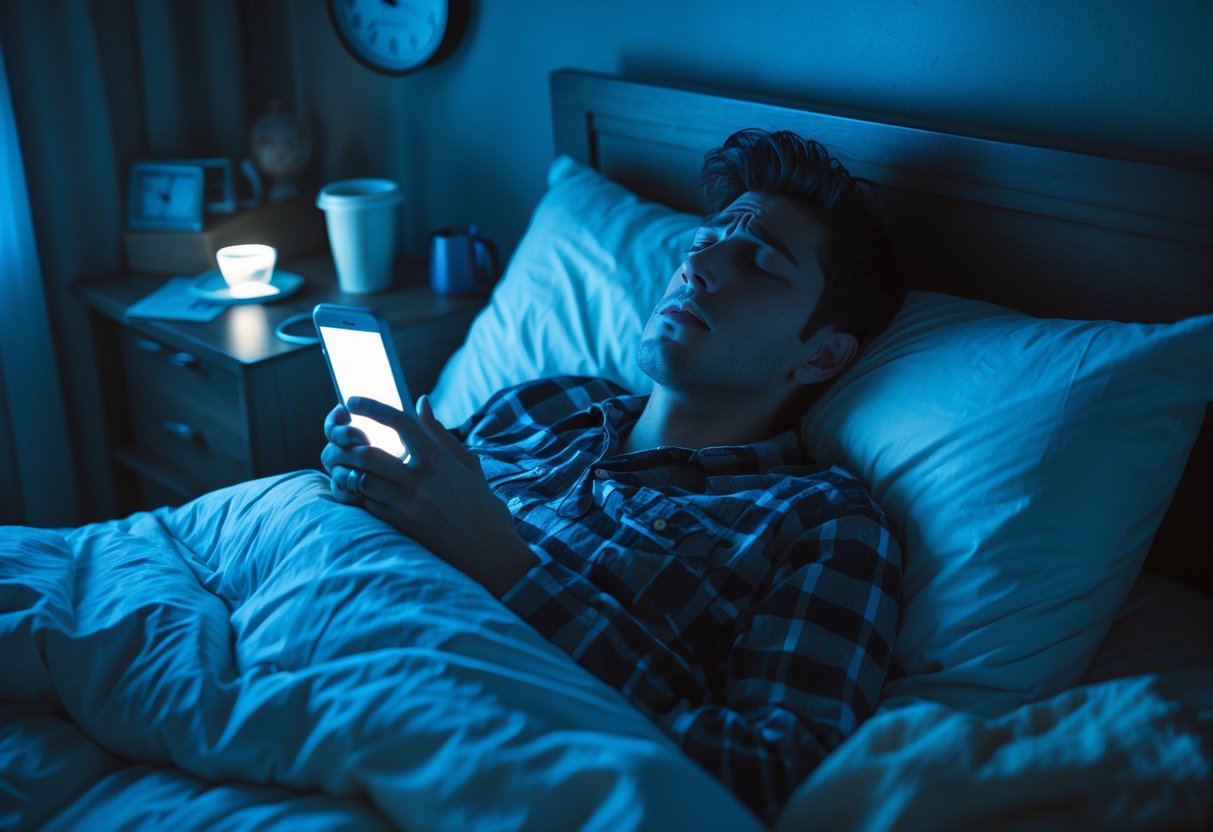
The habits people develop around sleep often work against their natural ability to rest well. From checking phones before bed to drinking coffee too late in the day, these common sleep mistakes[1] create a cycle of poor sleep that affects both physical and mental health. Even small changes to daily routines can make a big difference in sleep quality.
Understanding which behaviors hurt sleep quality helps people make simple adjustments that lead to better rest. The good news is that most sleep hygiene mistakes are easy to fix once you know what to look for. Sleep experts have identified[2] the most common problems that keep people awake at night.
Key Takeaways
- Inconsistent sleep schedules and poor bedtime routines are major causes of sleep problems
- The sleeping environment and evening habits directly impact how well you fall asleep and stay asleep
- Simple changes to daily routines and sleep hygiene practices can quickly improve sleep quality
Understanding Sleep Hygiene and Its Impact
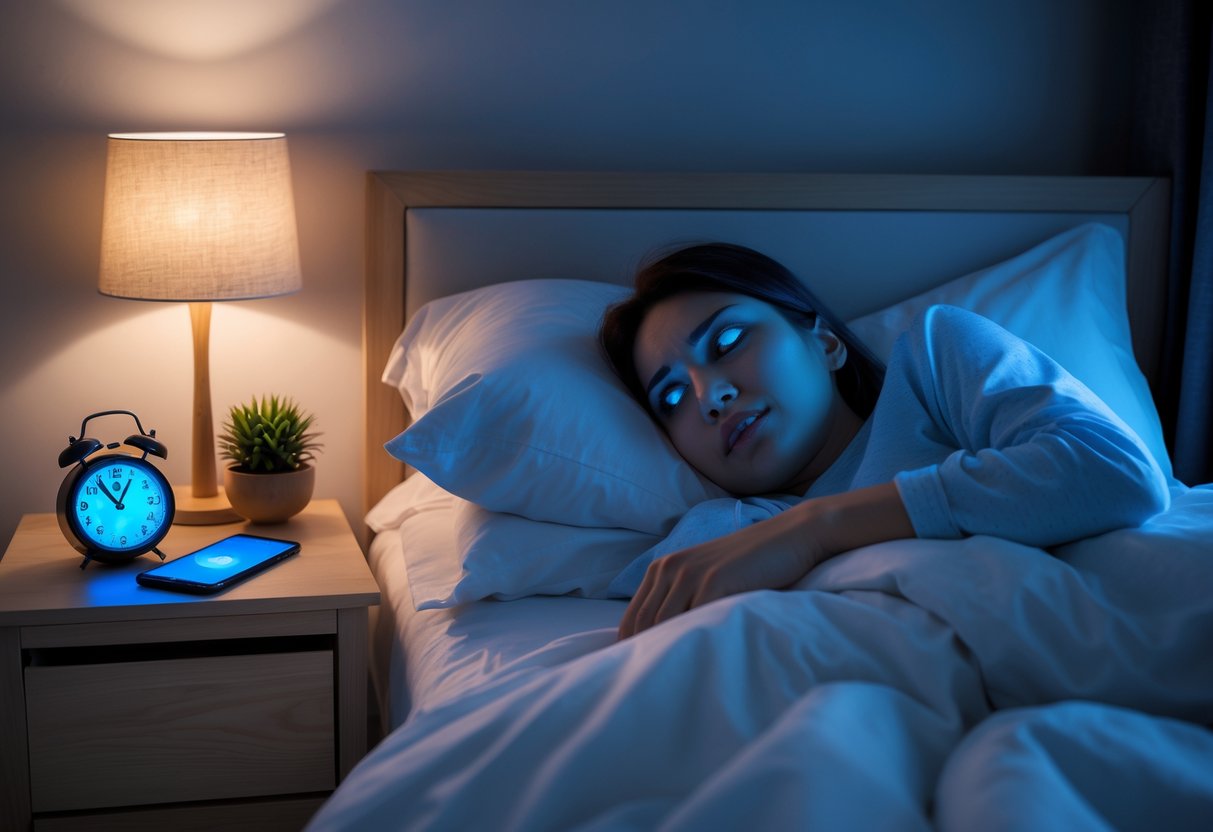
Sleep hygiene encompasses both environmental factors and daily habits[3] that directly influence how well people rest each night. Poor sleep practices create a cascade of health problems that extend far beyond simple tiredness.
What Is Sleep Hygiene?
Sleep hygiene refers to the collection of behaviors, routines, and environmental conditions that promote consistent, quality sleep. This concept goes beyond just having a regular bedtime.
The practice includes maintaining a fixed sleep schedule seven days per week. It involves creating specific pre-sleep routines that signal the body to prepare for rest.
Environmental factors play a crucial role in healthy sleep habits[4]. These include room temperature, lighting conditions, and noise levels.
Key Components of Sleep Hygiene:
- Consistent sleep and wake times
- Bedroom temperature around 65°F
- Dark, quiet sleeping environment
- Limited screen time before bed
- Regular daytime light exposure
Daily habits also impact sleep quality significantly. Caffeine consumption, exercise timing, and meal schedules all affect how easily people fall asleep and stay asleep throughout the night.
How Poor Habits Disrupt Sleep Quality
Poor sleep hygiene creates multiple barriers to achieving better rest. These disruptions often compound each other, making sleep problems worse over time.
Irregular sleep schedules confuse the body’s internal clock. When people go to bed at different times each night, their circadian rhythm cannot establish a predictable pattern.
Screen exposure before bedtime suppresses melatonin production. The blue light from phones, tablets, and televisions tricks the brain into thinking it’s still daytime.
Common Disruptive Habits:
- Using devices within one hour of bedtime
- Consuming caffeine after 2 PM
- Taking long or late afternoon naps
- Eating large meals close to bedtime
- Keeping the bedroom too warm or too bright
Caffeine consumption late in the day blocks adenosine receptors. This prevents the natural drowsiness that builds throughout waking hours.
Environmental disruptions like noise, light, or uncomfortable temperatures fragment sleep cycles. Even brief awakenings prevent the deep, restorative stages of sleep from occurring properly.
Link Between Sleep Hygiene and Health Outcomes
Poor sleep hygiene contributes to serious health conditions beyond simple fatigue. Sleep deprivation affects nearly every system in the human body.
Cardiovascular disease rates increase significantly in people who consistently get less than seven hours of sleep per night. Poor sleep raises blood pressure and increases inflammation markers.
Diabetes risk doubles when sleep quality remains poor over extended periods. Sleep loss affects insulin sensitivity and glucose metabolism directly.
Obesity becomes more likely as sleep deprivation disrupts hormones that control hunger. Leptin and ghrelin levels change, causing increased appetite and cravings for high-calorie foods.
Mental health suffers dramatically from poor sleep hygiene. Moodiness, irritability, and difficulty concentrating appear within days of inadequate rest.
Insomnia often develops when poor sleep habits become entrenched patterns. What starts as occasional sleeplessness can become chronic sleep disorders requiring medical intervention.
The immune system weakens with consistent sleep loss. People with poor sleep hygiene get sick more often and take longer to recover from illnesses.
Mistake #1: Inconsistent Sleep Schedules
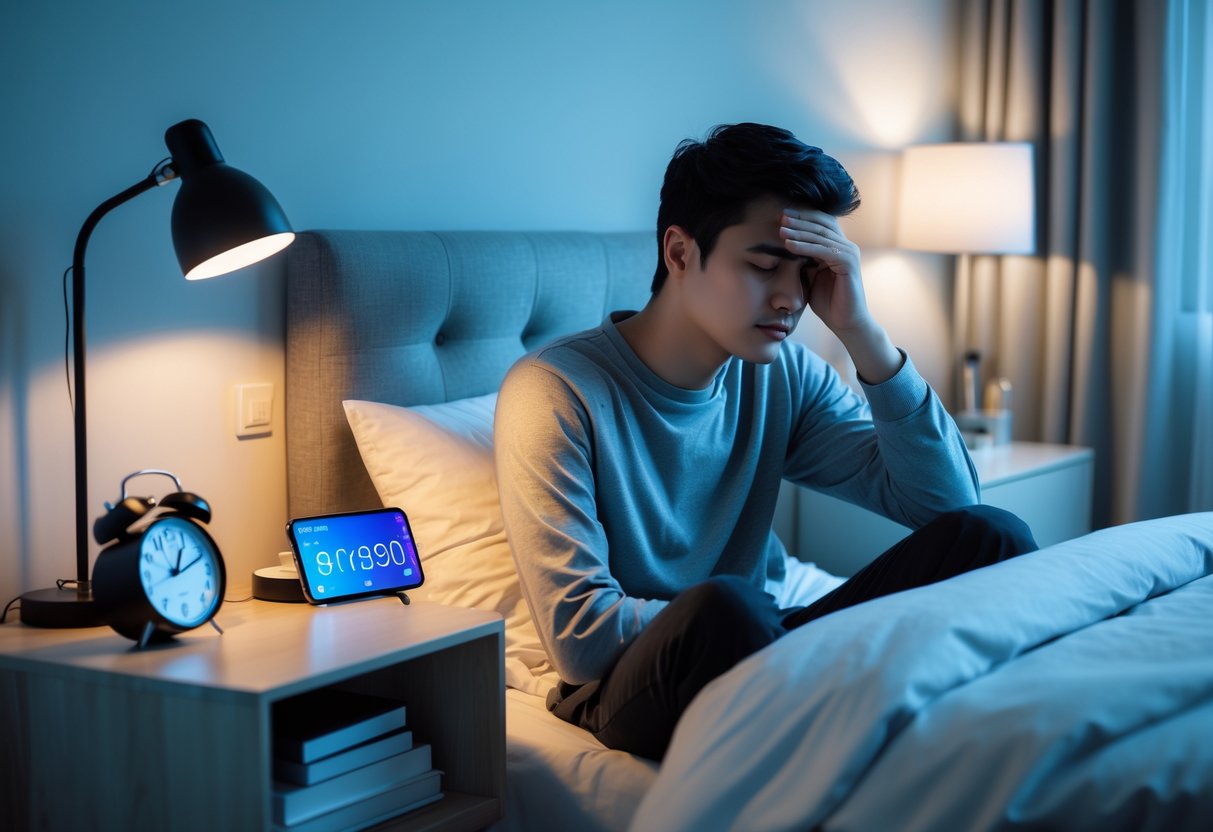
Going to bed at different times each night disrupts your body’s natural clock and makes falling asleep harder. Your circadian rhythm depends on regular patterns, and even small changes can cause daytime drowsiness and poor sleep quality.
Harmful Effects of Irregular Bedtimes
Inconsistent sleep schedules interfere with melatonin release[5], the hormone that controls when you feel sleepy. When bedtimes vary by more than 30 minutes, your body struggles to predict when sleep should begin.
People with irregular schedules often experience:
- Difficulty falling asleep at their desired time
- Increased daytime drowsiness even after getting enough hours of sleep
- Mood changes and irritability
- Reduced focus during daytime activities
Your body temperature naturally drops before sleep to prepare for rest. Erratic bedtimes prevent this temperature shift from happening at the right time. This leaves you feeling alert when you want to sleep.
Blood pressure also follows daily patterns tied to your sleep schedule. When bedtimes change frequently, blood pressure regulation becomes less predictable.
Why Sleep Consistency Matters
Your circadian rhythm acts like an internal clock that runs on a 24-hour cycle. This biological system controls when you feel awake or sleepy throughout the day.
Sleep consistency helps this internal clock stay synchronized with the outside world. When you go to bed and wake up at the same times daily, your circadian rhythm becomes stronger and more reliable.
| Consistent Schedule | Inconsistent Schedule |
|---|---|
| Predictable melatonin release | Delayed or irregular melatonin |
| Stable body temperature patterns | Disrupted temperature cycles |
| Better sleep quality | Fragmented sleep |
Even weekend sleep-ins can throw off this delicate timing. Maintaining the same wake time is crucial[6] for keeping your internal clock stable.
Your brain learns to anticipate sleep when you stick to regular patterns. This makes falling asleep faster and achieving deeper rest much easier.
How Social Jetlag Undermines Rest
Social jetlag happens when your social schedule conflicts with your natural sleep needs. Many people sleep later on weekends, then struggle to adjust back to weekday schedules.
This pattern creates the same effects as traveling across time zones. Your body experiences confusion about what time it really is. Monday mornings become especially difficult as your internal clock readjusts.
Common signs of social jetlag include:
- Feeling groggy on Monday mornings
- Needing extra caffeine to stay alert
- Difficulty falling asleep Sunday nights
- Chronic fatigue despite getting adequate hours of sleep
Weekend schedule shifts of just two hours can disrupt your circadian rhythm for several days. Your body needs time to reset its internal timing after each disruption.
People who work irregular shifts face similar challenges. Their circadian rhythms never fully adapt to changing schedules, leading to ongoing sleep problems and daytime drowsiness.
Mistake #2: Ignoring Circadian Rhythm Cues
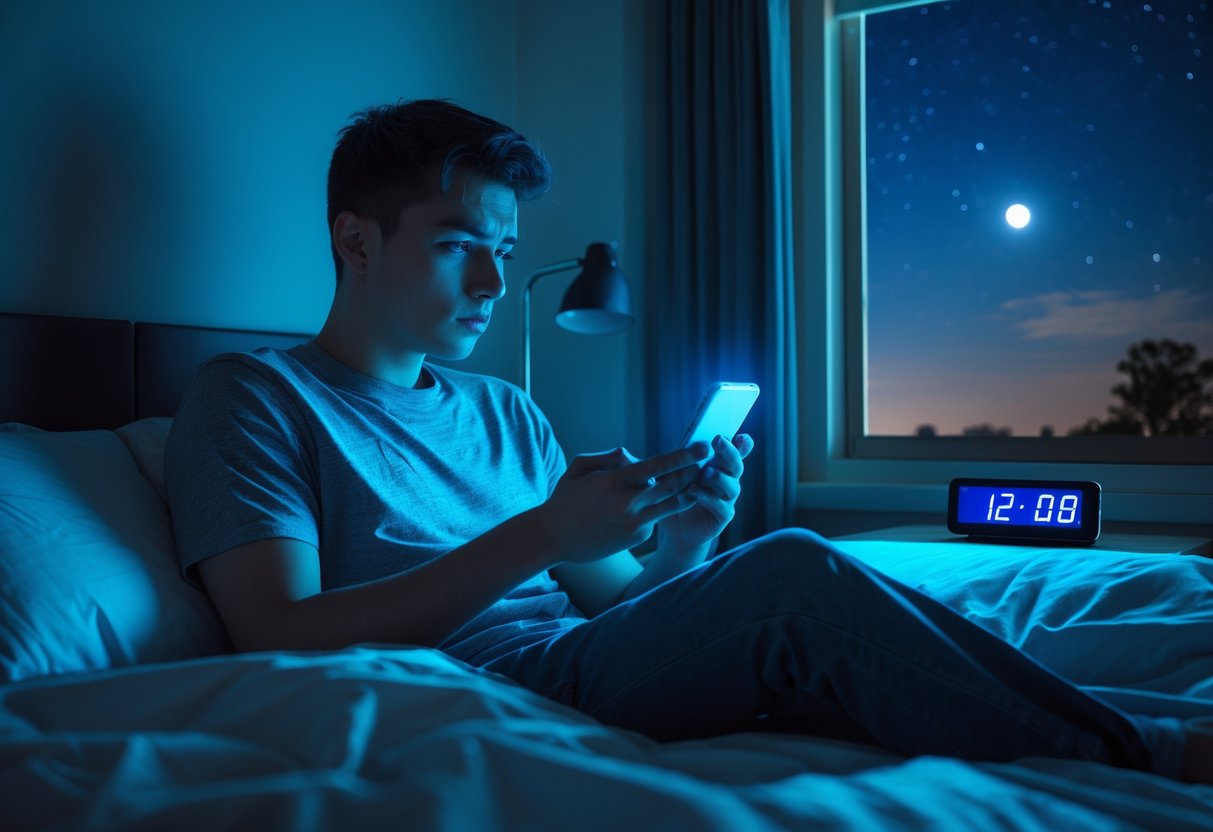
Your body runs on a 24-hour internal clock that controls when you feel sleepy and alert. Irregular sleep patterns disrupt the body’s internal clock[7], making it harder to fall asleep and stay asleep.
Skipping Morning Light Exposure
Morning sunlight tells your brain to stop making melatonin and start your day. When people skip this natural wake-up signal, their circadian rhythm gets confused.
The body needs bright light within the first hour of waking. This light exposure helps reset the internal clock each day. Without it, melatonin production stays high longer than it should.
People who stay indoors all morning often feel groggy for hours. They also have trouble falling asleep at night because their body clock is off schedule.
Natural sunlight works best for circadian rhythm health. Even 10-15 minutes outside can make a big difference. On cloudy days, sitting by a bright window helps too.
Indoor lighting is usually too dim to trigger the right response. Most home and office lights only provide 200-500 lux, while your circadian rhythm needs at least 1,000 lux to respond properly.
Nighttime Light Exposure From Screens
Blue light from phones, tablets, and TVs tricks the brain into thinking it’s still daytime. This stops melatonin production when your body should be getting ready for sleep.
Screen light can delay sleep by 1-2 hours. The brain sees this artificial light and keeps you alert instead of sleepy. Even dim screens can affect your circadian rhythm.
Many people use devices right before bed without realizing the impact. Light exposure and nervous system overload throw off natural sleep patterns[8].
Sleep efficiency drops when circadian rhythms are disrupted. This means less time in deep sleep and REM sleep stages that help you feel rested.
The effects last longer than most people think. Using bright screens can affect sleep quality even if you put the device away an hour before bed.
Mistake #3: Poor Bedtime Routines and Evening Habits
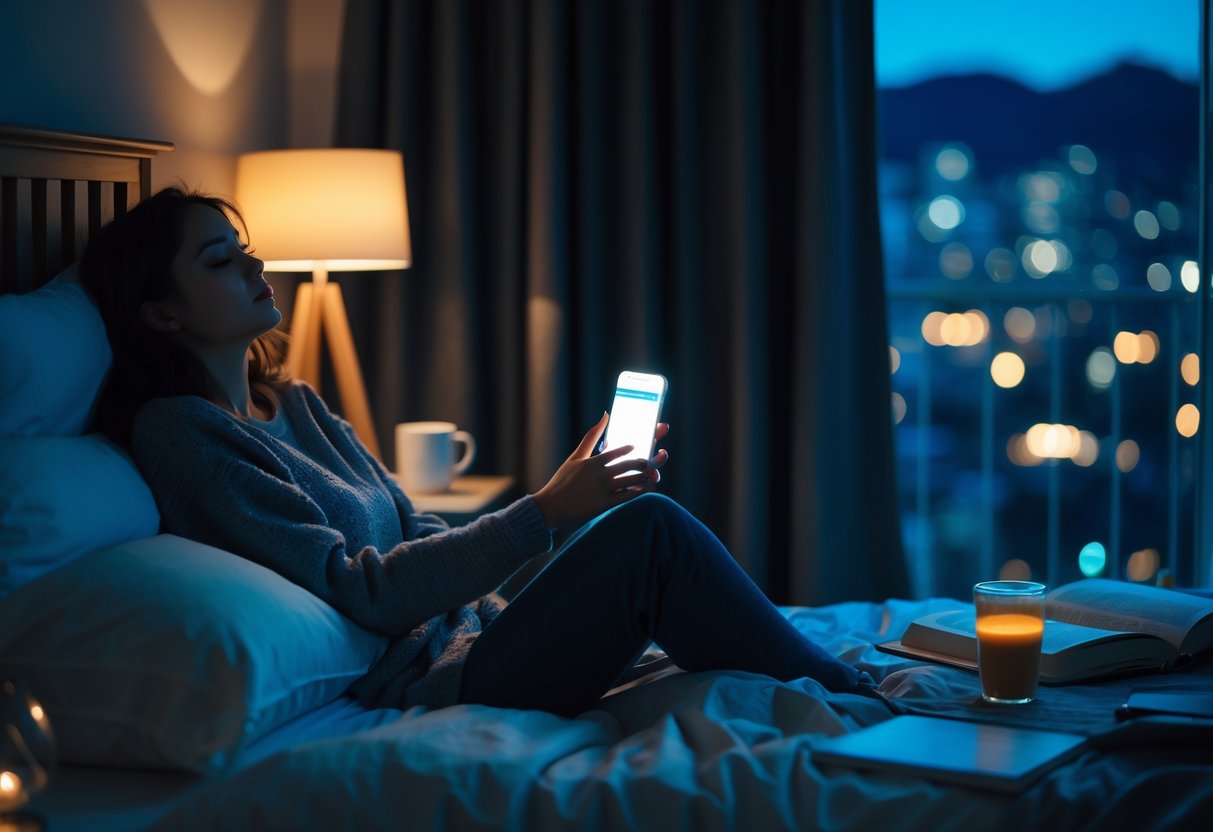
Many people unknowingly sabotage their sleep with stimulating activities, inconsistent routines, and excessive screen exposure in the hours before bed. These common nighttime routine mistakes[9] can significantly reduce sleep efficiency and increase the time it takes to fall asleep.
Stimulating Activities Before Bed
Engaging in high-energy activities within two hours of bedtime keeps the nervous system activated when it should be winding down. Exercise, intense video games, and heated discussions trigger cortisol release and raise heart rate.
Activities to avoid before bed:
- Vigorous exercise or strength training
- Competitive video games or fast-paced movies
- Work-related tasks or problem-solving
- Intense conversations or arguments
The body needs time to transition from an alert state to a relaxed one. Physical activity raises core body temperature, which must drop for sleep onset to occur naturally.
Instead of stimulating activities, gentle stretching, reading, or listening to calm music helps signal the brain that bedtime approaches. These daily habits that wreck sleep[10] can be replaced with calming alternatives.
Irregular or Rushed Bedtime Routine
A rushed or inconsistent bedtime routine prevents the brain from recognizing sleep cues. When someone goes to bed at different times each night or skips their usual pre-sleep activities, their internal clock becomes confused.
Signs of poor routine:
- Going to bed at wildly different times
- Rushing through hygiene tasks
- No consistent pre-sleep activities
- Feeling unprepared for sleep
Sleep anxiety often develops when people don’t follow a predictable sequence before bed. The mind remains active because it hasn’t received clear signals that sleep time has arrived.
A consistent routine should take 30-60 minutes and include the same activities in the same order each night. This might include taking a shower, brushing teeth, reading, and doing light stretches.
People who maintain consistent sleep schedules and routines[11] report falling asleep faster and experiencing fewer middle-of-the-night awakenings.
Excess Screen Time at Night
Blue light from phones, tablets, and computers suppresses melatonin production for up to three hours after exposure. This delay can push sleep onset later and reduce overall sleep quality.
Screen exposure effects:
- Suppresses melatonin by up to 50%
- Increases alertness when drowsiness should occur
- Creates mental stimulation from content consumption
- Can trigger sleep anxiety in some individuals
The light from screens tricks the brain into thinking it’s still daytime. Social media, news, and entertainment also provide mental stimulation that keeps the mind active.
Solutions for screen use:
- Stop all screens 1-2 hours before bed
- Use blue light filtering glasses or apps
- Keep phones in another room while sleeping
- Replace screen time with reading physical books
Some people experience panic attacks or heightened anxiety when they can’t fall asleep after late-night screen use. Creating a restful environment[12] without digital distractions helps prevent this cycle.
Mistake #4: Unhealthy Sleeping Environments
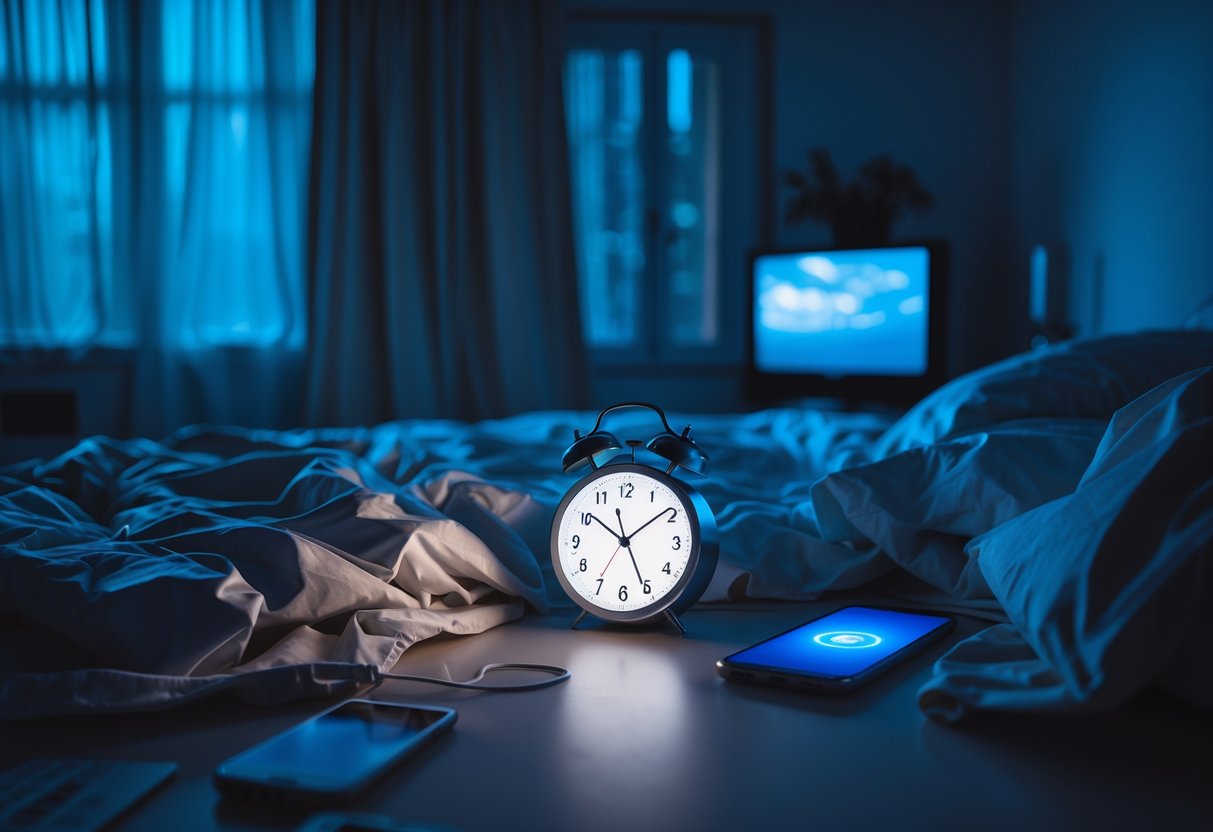
Your bedroom environment directly affects how well you sleep each night. Light pollution, temperature problems, and using your bed for activities other than sleep can disrupt your natural sleep patterns and keep you awake.
Excess Light and Noise Disruptions
Light exposure at night tricks your brain into thinking it’s still daytime. This stops your body from making melatonin, the hormone that makes you feel sleepy.
Even small amounts of light from street lamps, electronics, or hallways can disrupt sleep quality[13]. Your brain stays more alert when it detects light through your eyelids.
Blackout curtains are one of the best ways to block outside light. They can reduce light by up to 99% compared to regular curtains.
Other light sources to eliminate include:
- LED clocks with bright displays
- Phone charging lights
- Light from under doors
- Standby lights on electronics
Noise pollution is equally harmful to sleep. Sudden sounds can wake you up or prevent you from reaching deep sleep stages. Traffic, neighbors, and household noises all interfere with rest.
Even if noise doesn’t fully wake you, it can cause your heart rate to increase. This makes your sleep lighter and less refreshing.
White noise machines or earplugs can help block disruptive sounds. Some people with sleep apnea[1] find that reducing noise helps them sleep better with their treatment devices.
Temperature and Comfort Issues
Your body temperature naturally drops when you’re ready to sleep. If your bedroom is too hot or cold, this process gets disrupted.
The best sleeping temperature is between 60-68°F (15-20°C). Temperatures above 70°F can make it hard to fall asleep and stay asleep.
Hot environments cause several problems:
- Increased sweating and discomfort
- More frequent wake-ups during the night
- Reduced time in deep sleep stages
- Higher stress hormone levels
Cold rooms below 60°F can also cause problems. Your muscles may tense up, and you might spend energy trying to stay warm instead of sleeping.
Humidity matters too. Very dry air can cause throat irritation and stuffiness. Too much humidity makes you feel sticky and uncomfortable.
Mattress and pillow comfort directly affect sleep quality. Old, sagging mattresses can worsen back pain and cause frequent position changes. This is especially important for people with conditions like restless leg syndrome.
Replace mattresses every 7-10 years. Choose pillows that support your neck in a neutral position.
Using Bed For Non-Sleep Activities
Your bed should only be used for sleep and intimate activities. When you do other things in bed, your brain stops associating it with sleep time.
Common activities that hurt sleep hygiene practices[12] include:
- Watching TV or streaming shows
- Working on laptops or tablets
- Eating meals or snacks
- Having long phone conversations
- Playing video games
These activities make your mind more active and alert. Your brain learns to expect stimulation when you get into bed instead of relaxation.
Screen time in bed is particularly harmful. Blue light from devices suppresses melatonin production for several hours. The content you consume can also increase stress or excitement.
Work-related activities in bed create mental associations between your sleeping space and stress. Your mind may start racing about deadlines or problems when you lie down.
Reading before bed can be helpful if you use a dim light and choose calming material. Avoid exciting books or anything that makes you want to stay awake to keep reading.
Creating strong sleep associations helps train your brain. When you consistently use your bed only for sleep, you’ll fall asleep faster and sleep more deeply.
Mistake #5: Food, Drink, and Substance Missteps
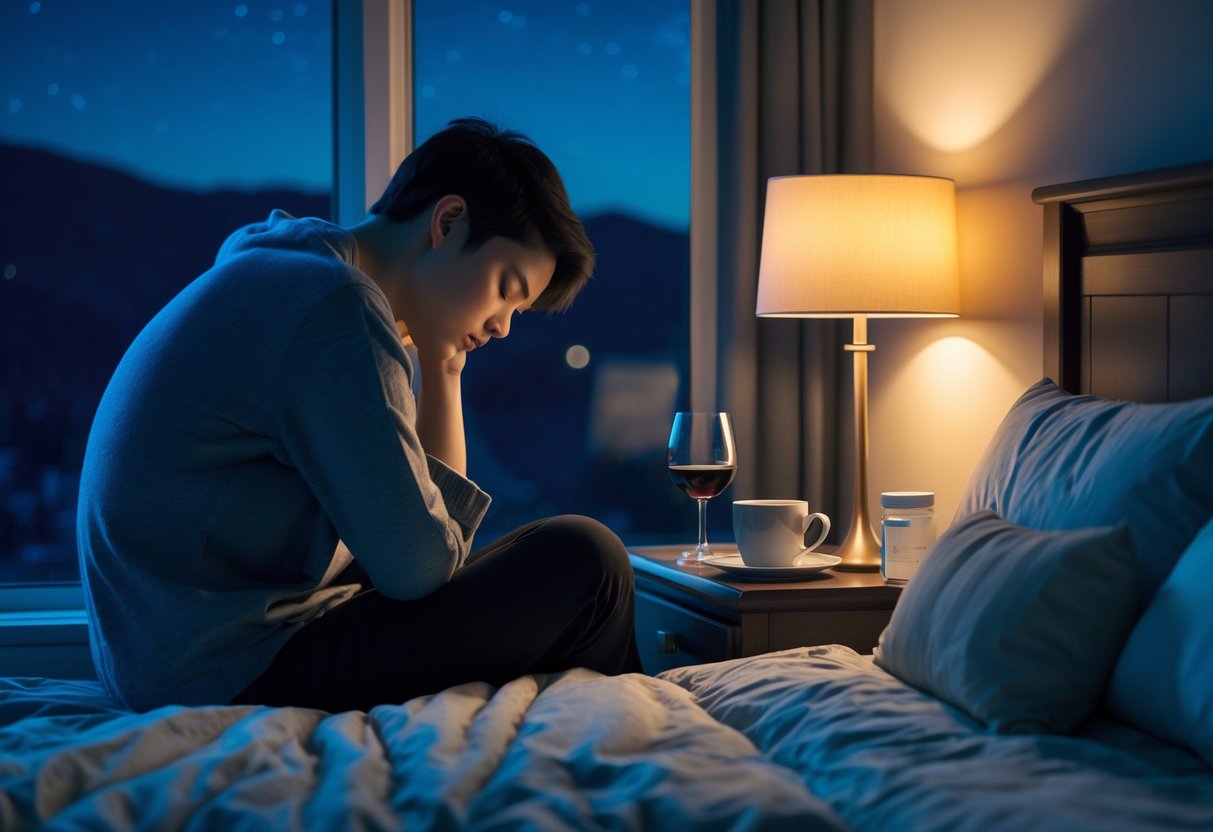
What you eat and drink can ruin your sleep quality and make it hard to fall asleep. Many people don’t realize that alcohol disrupts sleep architecture[14] and caffeine stays in the body for hours.
Late-Night Eating and Drinking
Eating large meals close to bedtime forces the body to work on digestion when it should be winding down. This can raise body temperature and heart rate, making sleep difficult.
Heavy foods take 3-4 hours to digest properly. Spicy or acidic foods can cause heartburn when lying down.
Foods to avoid before bed:
- Fatty or fried foods
- Spicy dishes
- Large portions
- Citrus fruits
- Chocolate
Drinking too much liquid before bed leads to bathroom trips that break up sleep cycles. This interrupts REM sleep, which is important for mental recovery.
The ideal cutoff time for eating is 3 hours before bedtime. For drinks, stop consuming large amounts 2 hours before sleep.
Light snacks are okay if hunger strikes. Choose foods with tryptophan like turkey, milk, or bananas.
Caffeine and Alcohol Intake Close to Bedtime
Caffeine blocks adenosine, a chemical that makes people feel tired. It can stay in the system for 6-8 hours after consumption.
Even afternoon coffee can affect nighttime sleep. People who drink caffeine after 2 PM often take longer to fall asleep and get fewer hours of sleep overall.
Hidden caffeine sources:
- Chocolate
- Some pain medications
- Energy drinks
- Green tea
- Decaf coffee (small amounts)
Alcohol may help people fall asleep initially but disrupts sleep quality[14]. It prevents deep sleep stages and reduces REM sleep.
Alcohol acts as a diuretic, causing more bathroom trips during the night. It can also increase heart rate and blood pressure during sleep.
The body processes alcohol at about one drink per hour. Stop drinking alcohol at least 3 hours before bedtime for better sleep quality.
Nicotine and Other Stimulants
Nicotine is a powerful stimulant that increases heart rate and blood pressure. Smokers often have trouble falling asleep and staying asleep.
Nicotine withdrawal during the night can wake people up early. This creates a cycle where smokers feel they need cigarettes to relax.
Other stimulants that hurt sleep:
- Diet pills
- Some antidepressants
- Decongestants
- Steroids
- Thyroid medications
People who use nicotine close to bedtime get less REM sleep and wake up more during the night. They also report feeling less rested in the morning.
Even nicotine gum or patches can interfere with sleep if used too late in the day. The last use should be at least 2-3 hours before bedtime.
Quitting smoking improves sleep quality within weeks. Sleep becomes deeper and people wake up less often during the night.
Mistake #6: Napping and Daytime Habits That Interfere with Sleep
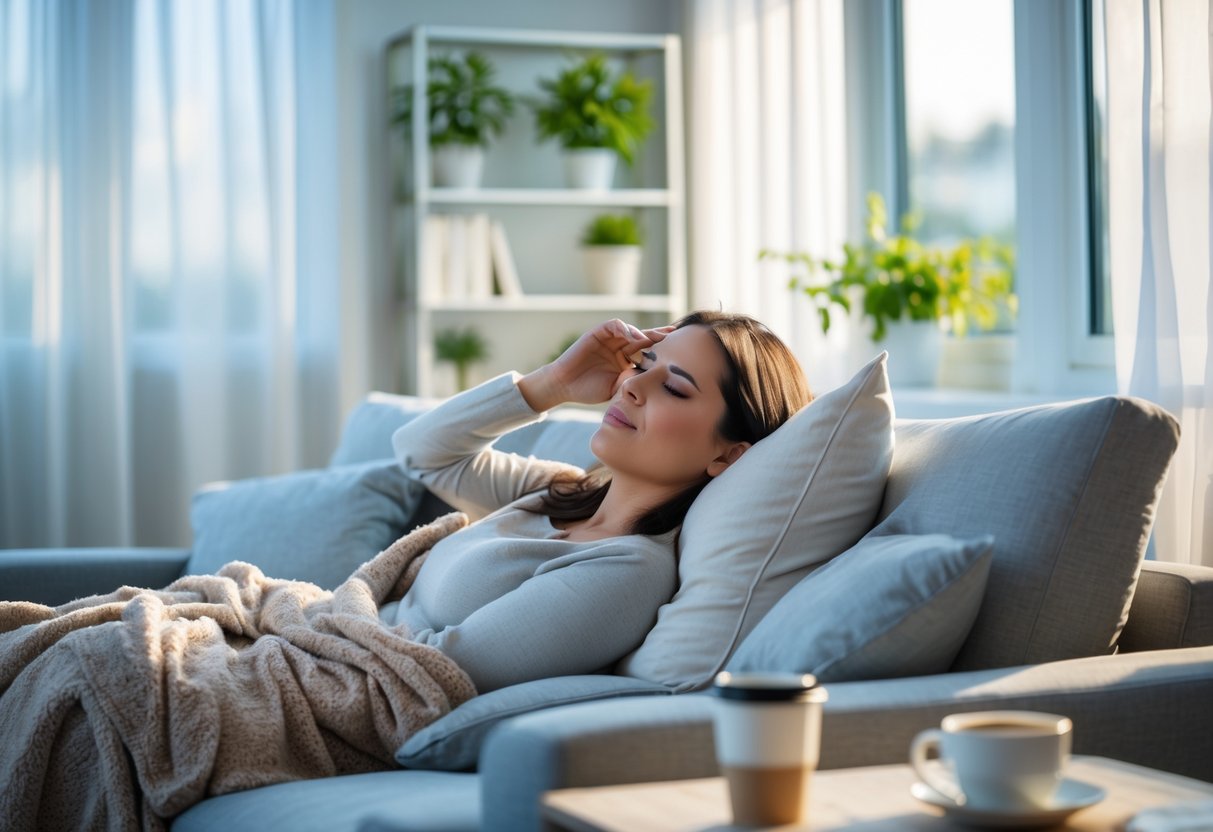
Poor timing of naps and exercise can disrupt your natural sleep cycle. These daytime activities affect your body’s ability to fall asleep at night when done at the wrong times.
Overlong or Late Napping
Long naps or those taken after 3 PM can make it harder to fall asleep at bedtime. Daytime napping reduces sleep drive[15], which is your body’s natural need for sleep.
Optimal napping guidelines:
- Keep naps to 30 minutes or less
- Nap between 1 PM and 3 PM only
- Set an alarm to avoid oversleeping
Naps longer than 30 minutes can put you into deep sleep. Waking up from deep sleep leaves people feeling groggy and confused.
People who are sleep deprived may feel they need longer naps. However, this creates a cycle where long naps prevent good nighttime sleep.
Short naps don’t affect sleep quality overnight[16] for most people. But those who already struggle to fall asleep should avoid napping completely.
Exercise at the Wrong Time
Exercise raises your body temperature and releases stimulating hormones. Working out too close to bedtime keeps your body in an alert state.
Exercise timing recommendations:
- Finish intense workouts 3-4 hours before bed
- Light stretching or yoga is okay closer to bedtime
- Morning or afternoon exercise promotes better sleep
Your core body temperature needs to drop for sleep to occur naturally. Vigorous exercise prevents this temperature drop for several hours.
People who exercise late often report lying awake feeling wired. Their heart rate stays elevated and stress hormones remain high.
Regular exercise during the day actually improves sleep quality. The key is timing workouts early enough to allow your body to wind down completely.
Mistake #7: Ignoring Medical and Psychological Barriers
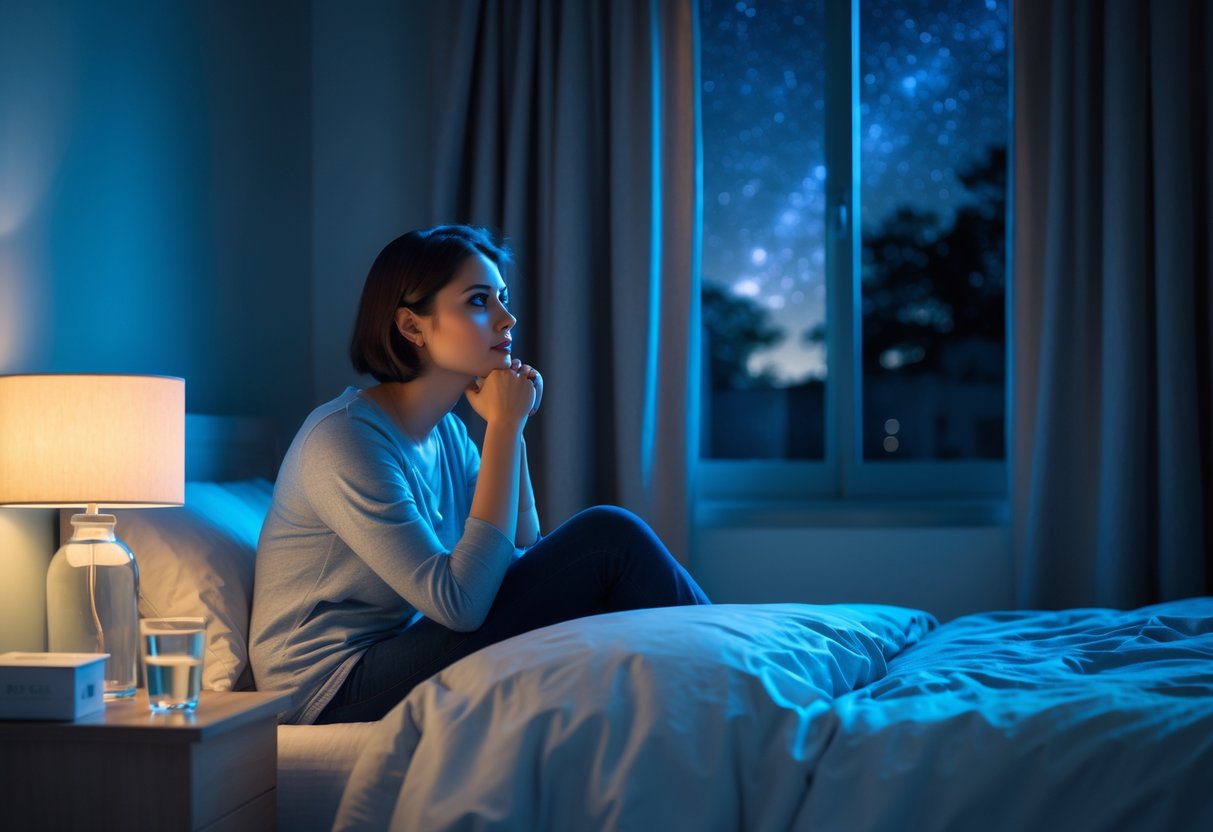
Many people struggle with sleep problems that go beyond basic hygiene mistakes. Undiagnosed medical conditions, untreated mental health issues, and improper use of sleep medications can create persistent barriers to restful sleep.
Undiagnosed Sleep Disorders
Sleep disorders affect millions of people who remain unaware of their conditions. Sleep apnea causes breathing interruptions during sleep, leading to frequent wake-ups and poor sleep quality.
People with sleep apnea often experience loud snoring, gasping, and morning headaches. Their partners may notice breathing pauses during the night.
Restless leg syndrome creates uncomfortable sensations in the legs, especially at bedtime. This condition makes it difficult to fall asleep and stay asleep.
The urge to move the legs becomes stronger when lying down. Many people with this condition feel crawling, tingling, or burning sensations.
Chronic insomnia goes beyond occasional sleepless nights. It involves persistent difficulty falling asleep or staying asleep for at least three months.
Primary insomnia occurs without other medical causes. Secondary insomnia results from medications, medical conditions, or substance use.
Mental Health Factors Affecting Sleep
Anxiety and depression create significant sleep disruptions that require professional attention. Poor sleep hygiene can lead to stress, anxiety, and depression[17] according to sleep research.
Sleep anxiety develops when people worry excessively about getting enough rest. This worry creates a cycle where anxiety about sleep prevents actual sleep.
Racing thoughts at bedtime keep the mind active when it should be winding down. Worries about work, relationships, or health problems interfere with relaxation.
Panic attacks can occur during sleep or upon waking. Night panic attacks cause rapid heartbeat, sweating, and intense fear without obvious triggers.
Depression often disrupts normal sleep patterns. People may experience early morning awakening, frequent night wakings, or sleeping too much.
Over-Reliance on Sleep Medications
Many people turn to sleep medications without addressing underlying causes. Sleep aids can create dependence and mask serious sleep disorders.
Prescription sleep medications work for short-term use but lose effectiveness over time. The body develops tolerance, requiring higher doses for the same effect.
Over-the-counter sleep aids contain antihistamines that cause drowsiness. These medications can lead to next-day grogginess and reduced cognitive function.
Sleep medication rebound occurs when stopping these drugs suddenly. Sleep becomes worse than before starting the medication.
Some people use alcohol as a sleep aid, but alcohol can disrupt sleep architecture and make sleep less restorative[18]. This creates poor quality sleep despite feeling drowsy initially.
Natural alternatives like melatonin supplements should be used carefully. Taking too much or at the wrong time can disrupt the body’s natural sleep-wake cycle.
Frequently Asked Questions
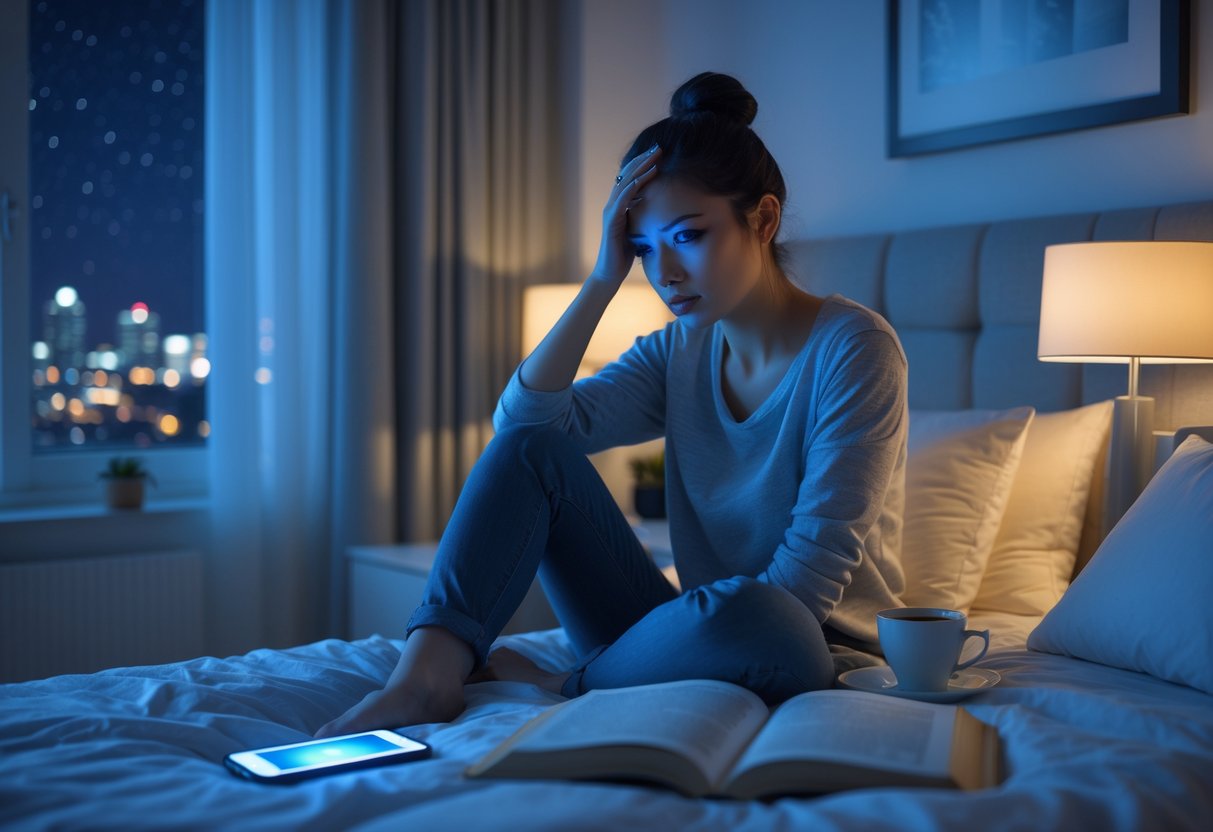
People often make basic mistakes that hurt their sleep without realizing it. Common problems include checking phones at night, drinking caffeine too late, and staying in bed when unable to sleep.
What are common sleep hygiene mistakes that can lead to insomnia?
Checking the time during nighttime awakenings[2] activates the brain and creates anxiety about lost sleep. This simple action triggers mental math about remaining sleep hours.
Tossing and turning in bed for more than 15-30 minutes[2] trains the brain to view the bedroom as a place for stress rather than rest. Getting up and moving to another room helps break this pattern.
People often keep irregular sleep schedules by going to bed at different times each night. This confuses the body’s internal clock and makes falling asleep harder.
Napping too late in the day or for too long reduces nighttime sleepiness. Afternoon naps should be limited to 20-30 minutes and finished before 3 PM.
Which pre-bedtime habits should be avoided to ensure better sleep quality?
Looking at phone notifications[2] exposes people to blue light that makes it harder for brains to enter rest mode. Charging phones in another room removes this temptation completely.
Exercising within three hours of bedtime raises body temperature and heart rate. These physical changes make it difficult for the body to wind down naturally.
Eating large meals close to bedtime forces the digestive system to work overtime. This can cause discomfort and interfere with the body’s natural sleep preparation.
Taking hot showers right before bed might seem relaxing but can actually raise core body temperature. The body needs to cool down to trigger sleepiness.
What are the signs that indicate one’s sleep hygiene may be poor?
Taking longer than 30 minutes to fall asleep regularly indicates poor sleep preparation habits. Good sleep hygiene should help people fall asleep within 15-20 minutes.
Waking up frequently during the night and struggling to fall back asleep suggests environmental or behavioral issues. Sleep experts note that difficulty returning to sleep should not be normal[2].
Feeling tired despite getting 7-8 hours of sleep points to poor sleep quality rather than quantity. This often results from disrupted sleep cycles or poor sleep environment.
Relying on caffeine to stay alert throughout the day indicates insufficient or poor-quality nighttime rest. People with good sleep hygiene wake up feeling naturally refreshed.
Can certain foods or drinks consumed before bed disrupt sleep?
Caffeine consumed within six hours of bedtime can interfere with falling asleep. This includes coffee, tea, chocolate, and some sodas that contain hidden caffeine.
Alcohol might make people feel drowsy initially but disrupts sleep quality later in the night. It prevents deep sleep stages and causes frequent awakenings.
Spicy foods can cause heartburn and indigestion that make lying down uncomfortable. The body temperature increase from spicy foods also works against natural cooling needed for sleep.
High-sugar foods and drinks cause blood sugar spikes and crashes. These fluctuations can wake people up during the night as blood sugar levels drop.
How does screen time before bed impact sleep quality?
Blue light from phones, tablets, and computers suppresses melatonin production. Melatonin is the hormone that signals to the brain that it’s time to sleep.
The mental stimulation from social media, news, or work emails keeps the brain active and alert. This cognitive arousal makes it harder to transition into a restful state.
Screen brightness tricks the brain into thinking it’s still daytime. Even dimmed screens can interfere with the body’s natural circadian rhythm signals.
The habit of checking devices in bed creates a mental association between the bedroom and alertness. This weakens the brain’s connection between bed and sleep.
What techniques can one use to relax and prepare for sleep?
Progressive muscle relaxation involves tensing and releasing muscle groups from toes to head. This technique helps identify and release physical tension that prevents sleep.
Deep breathing exercises slow heart rate and activate the parasympathetic nervous system. Counting breaths or following breathing patterns gives the mind a calm focus.
Reading fiction books with dim lighting can help transition the brain into a quieter state. The key is choosing content that’s engaging but not overly stimulating.
Mental exercises like counting backward from 100 or naming animals alphabetically[2] give busy minds something neutral to focus on instead of worries or stress.
References
- 15 Doctors Share Bad Habits That Are Ruining Your Sleep. https://www.buzzfeed.com/lizmrichardson/doctors-sleep-tips-sleep-hygiene-mistakes Accessed November 9, 2025
- Sleep experts have identified. https://www.oprahdaily.com/life/health/a65337325/sleep-mistakes-keeping-you-awake/ Accessed November 9, 2025
- Mastering Sleep Hygiene: Your Path to Quality Sleep. https://www.sleepfoundation.org/sleep-hygiene Accessed November 9, 2025
- What Is Sleep Hygiene? Tips To Improve. https://health.clevelandclinic.org/sleep-hygiene Accessed November 9, 2025
- 7 Sleep Mistakes That Are Sabotaging Your Rest — And How To Correct Them. https://www.healthcarebusinesstoday.com/sleep-mistakes-sabotaging-rest-fix-tips/ Accessed November 9, 2025
- How to Actually Fix Your Sleep Schedule. https://health.clevelandclinic.org/how-to-fix-your-sleep-schedule Accessed November 9, 2025
- Attention Required!. https://facty.com/lifestyle/wellness/awake-again-10-sleep-hygiene-mistakes-to-avoid/ Accessed November 9, 2025
- Signs Your Body Clock Is Off—and Gentle Ways to Realign It — Dr. McKenzy Brewer, DC. https://www.drmckenzybrewer.com/blog/understanding-circadian-rhythms-aligning-your-body-clock-for-better-sleep Accessed November 9, 2025
- 3 common nighttime routine mistakes were keeping me awake — now I sleep through the night. https://www.tomsguide.com/wellness/nighttime-routine-mistakes-i-fixed-for-better-sleep Accessed November 9, 2025
- 8 Daily Habits That Wreck Your Sleep (and How to Fix Them). https://mommyrheum.com/2025/03/05/8-daily-habits-that-wreck-your-sleep-and-how-to-fix-them/ Accessed November 9, 2025
- Top 10 Sleep Hygiene Mistakes to Avoid. https://livinglifehealthily.com/common-sleep-hygiene-mistakes-to-avoid-2/ Accessed November 9, 2025
- Sleep hygiene: Simple practices for better rest. https://www.health.harvard.edu/staying-healthy/sleep-hygiene-simple-practices-for-better-rest Accessed November 9, 2025
- Poor Sleep Hygiene and How to Improve It for Better Sleep. https://sleepandcognition.org/poor-sleep-hygiene/ Accessed November 9, 2025
- Mistakes That Can Keep You Up at Night. https://www.sleeppsychology.com/sleep/mistakes-that-can-keep-you-up-at-night Accessed November 9, 2025
- Does Napping Impact Your Sleep at Night?. https://www.sleepfoundation.org/how-sleep-works/does-napping-impact-sleep-at-night Accessed November 9, 2025
- Napping: Do's and don'ts for healthy adults. https://www.mayoclinic.org/healthy-lifestyle/adult-health/in-depth/napping/art-20048319 Accessed November 9, 2025
- Poor Sleep Hygiene: Your Mental Health Pays The Price. https://sleepresearchfoundation.com/2025/03/24/poor-sleep-hygiene-your-mental-health-pays-the-price/ Accessed November 9, 2025
- Mistakes That Can Keep You Up at Night. https://www.sleeppsychology.com/sleep/mistakes-that-can-keep-you-up-at-night/ Accessed November 9, 2025
